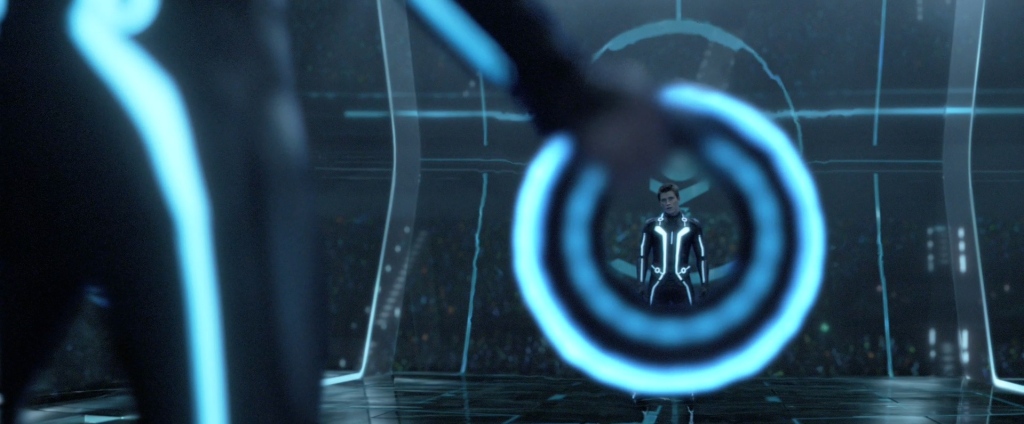Out of all the many, many franchises Disney owns, Tron has to be one of its more obscure and fascinating. With two films, a short-lived animated series, a short film, novels, comics and a slew of video games, the Tron franchise is certainly vast, yet it is mostly known for its cult following and devoted fans. The original 1982 film was groundbreaking in its extensive use of CGI and putting live actors into computer generated worlds – winning over critics, audiences and key industry figures. It took 28 years for a sequel to grace the silver screen, with Joseph Kosinski directing Tron: Legacy– a sequel that made a respectable $400 million box office gross but didn’t fare too well with critics. Tron: Legacy, to this day, garners praise for its striking visuals and pulsing electronic soundtrack, but its story and characters are often ridiculed. Sure, the film doesn’t exactly tell a masterful story with intelligent writing and dialogue, but there are so many narrative and thematic elements that deserve to be praised.
Following on from the original film, video-game developer and CEO of tech corporation ENCOM Kevin Flynn (Jeff Bridges) mysteriously disappears, leaving behind his son Sam (Garrett Hedlund). Years later, Sam receives a signal from his father’s old arcade and investigates, when he is transported to the digital world, the Grid, where Kevin has been trapped all this time. What follows is an action adventure ride where father and son reunite to escape the Grid, whilst having to contend with the villainous CLU (also played by Jeff Bridges): a digital copy of Kevin tasked with creating the perfect system and who will stop at nothing to achieve that goal. As well as the dangers of Artificial Intelligence, Tron: Legacy touches on father-son relationships, relationships with one’s self, the search for answers to the universe and the human condition, genocide, and so much more – all within a brisk two hour runtime.
Let’s start with Sam reuniting with his father. It isn’t until Sam enters the Grid, meets CLU and survives a thrilling Light Cycle game that he finally sees Kevin. The film takes its time to let the two reunite in a genuinely touching scene. Sam can’t hold back the tears and both are overwhelmed by how much the other has physically grown. Sam, Kevin and Quorra (Olivia Wilde), a program who spontaneously evolved within the Grid, sit for dinner (how eating works for humans and programs in a digital world is never explained) and use the opportunity to catch up. Kevin asks Sam questions about his life: about college, work, relationships. Of course Sam doesn’t have much to say and it’s clear Kevin is slightly disappointed with each answer. To add to the awkward nature of the conversation, Quorra and her childlike and naïve personality laughs and reacts at the wrong moments. On the flip side, Sam has just one question for his father: why did he never come back home all those years ago. It is a fascinating scene that looks into a particular aspect of familial relationships: how parents have certain expectations of the lives their children lead, and how children need their parents in their lives.

Having Kevin create not just an AI clone but a whole digital world calls into question how the video-game designer is playing God. When we first see Kevin after all those years trapped inside his own creation, he resembles a Christ-like figure: white robes, long hair and bare feet. The symbolism couldn’t be any clearer. When Kevin makes his dramatic entrance in the End-of-Line club, the atmosphere completely changes. The programs – the citizens of this world – are standing before their literal creator, their God. But as we’ve seen in other stories, playing God comes with severe consequences, and that comes in the form of CLU. A younger Kevin was intent on creating a perfect utopia and that mission was placed onto a computer program that would make it its sole purpose to achieve that goal. As we see in one of the many flashbacks, CLU is willing to kill his own creator to build a perfect system, and we know he aims to continue the mission outside of the Grid. CLU even commits genocide, wiping out a race of programs deemed imperfect. This particular plot strand harkens back to classic Isaac Asimov stories yet still feels fresh in this exploration, especially since Tron: Legacy was released before the string of modern science-fiction classics that decade, such as Ex Machina and Blade Runner 2049.
The biggest flaw with Tron: Legacy is that it simply juggles too many themes and messages. It’s truly admirable that alongside exhilarating set-pieces the film gets to explore so many hardcore science-fiction elements and complicated relationships, but the runtime and narrative doesn’t allow enough time to really make a mark or a powerful statement. A lot of the interesting details and story beats are squeezed into exposition-dump flashbacks, and there aren’t quite enough scenes to really bring out the relationships between the different characters. Buried within the dense plot are the blueprints for other Tron films, shows and stories that could fully realise the ideas presented in an engaging and impactful way.
Even with Disney releasing billion-dollar smash hits since then, it’s incredible that the company is still invested with the less profitable Tron franchise, with a third film on the way starring Jared Leto. As seen in Tron: Legacy, this digital world is rich with detail and lore for other storytellers to dive into and explore in their own projects. Hopefully it won’t take another twenty years for us users to get sucked back into the Grid again.


Leave a comment